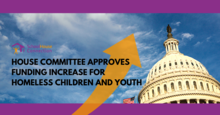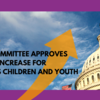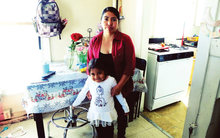0
Publication
Community:
May 14, 2019
For many students experiencing homelessness, school is the only place of stability in their lives. Teachers play a crucial role in creating a classroom environment that is safe and supportive for all students, especially those who are highly mobile and have experienced the trauma that often accompanies homelessness. Here, we provide information and strategies that teachers and support staff can use to support the educational success of students experiencing homelessness.
Authored by: SchoolHouse Connection
Topics: Child welfare, Education, Homelessness, Housing
 Shared by Housing Is
Shared by Housing Is
Housing Is posted a
on May 15, 2019
For many students experiencing homelessness, school is the only place of stability in their lives.
0
Policy Brief
Community:
May 9, 2019
On May 9, the House Appropriations Committee passed its FY2020 appropriations bill for Labor, Health and Human Services, and Education. The House bill includes $100 million in FY2020 funding for the McKinney-Vento Act’s Education for Homeless Children and Youth (EHCY) program. This represents a 7% increase over the FY2019 level; if enacted, it would represent a 30% increase in EHCY funding since FY2017.
Authored by: SchoolHouse Connection
Topics: Child welfare, Funding, Homelessness, Housing, Legislation & Policy
 Shared by Housing Is
Shared by Housing Is
Housing Is posted a
on May 15, 2019
On May 9, the House Appropriations Committee passed its FY2020 appropriations bill for Labor, Health and Human Services, and Education. The House bill includes $100 million in FY2020 funding for the McKinney-Vento Act’s Education for Homeless Children and Youth (EHCY) program.
0
Report
Community:
May 15, 2019
Where you live is linked to how healthy you are.Sadly, U.S. Latino communities are marked by lower-quality, unaffordable housing, as well as high risk for eviction and displacement. This contributes to health inequities in this population. That’s what we found in our new research review, The State of Latinos and Housing, Transportation, and Green Space, released on May 14, 2019, by my team at Salud America!, a national network for health equity at UT Health San Antonio.
Authored by: Amelie Ramirez for Salud America!, UT Health San Antonio and the National Low Income Housing Coalition
Topics: Health, Housing, Racial inequalities, Research
 Shared by Housing Is
Shared by Housing Is
Housing Is posted a
on May 15, 2019
Amelie Ramirez for Salud America!, UT Health San Antonio and the National Low Income Housing Coalition
Where you live is linked to how healthy you are.Sadly, U.S. Latino communities are marked by lower-quality, unaffordable housing, as well as high risk for eviction and displacement. This contributes to health inequities in this population.
0
Publication
Community:
May 14, 2019
Low- and moderate-income families in Puerto Rico would get a significant income boost from the Working Families Tax Relief Act, which would substantially expand the Child Tax Credit (CTC) in Puerto Rico as well as nationally and also help the Commonwealth expand its own, recently implemented Earned Income Tax Credit (EITC). The bill, which Senators Sherrod Brown, Michael Bennet, Richard Durbin, and Ron Wyden introduced recently, would reduce poverty and increase economic security for millions of working families in the United States, including Puerto Rico.
Authored by: Javier Balmaceda for The Center on Budget and Policy Priorities
Topics: Child welfare, Legislation & Policy, Low-income, U.S. Territories
 Shared by Housing Is
Shared by Housing Is
Housing Is posted a
on May 15, 2019
Javier Balmaceda for The Center on Budget and Policy Priorities
Low- and moderate-income families in Puerto Rico would get a significant income boost from the Working Families Tax Relief Act, which would substantially expand the Child Tax Credit (CTC) in Puerto Rico as well as nationally and also help the Commonwealth expand its own, recently implemented Earned
0
News Article
Community:
May 7, 2019
The Trump administration is proposing regulatory changes that could result in cuts in federal aid to millions of low-income Americans.
Authored by: Annie Karni for The New York Times
Topics: Food insecurity, Legislation & Policy, Low-income, Medicaid / Medicare
 Shared by Housing Is
Shared by Housing Is
Housing Is posted a
on May 14, 2019
Annie Karni for The New York Times
The Trump administration is proposing regulatory changes that could result in cuts in federal aid to millions of low-income Americans.
0
Video
Community:
Resident story gallery
Authored by: National Housing Trust and Enterprise Community Partners
Topics: Communications, Homelessness, Housing, Low-income
 Shared by Housing Is
Shared by Housing Is
Housing Is posted a
on May 13, 2019
National Housing Trust and Enterprise Community Partners
0
Video
Community:
May 9, 2019
On May 9, the Brookings Institution hosted an event to discuss the subsequent report, “A Roadmap to Reducing Child Poverty.” The event featured comments from Greg Duncan, who served as Chair of the Committee on Building an Agenda to Reduce the Number of Children in Poverty by Half in 10 Years, as well as a panel discussion on the report, its recommendations, and barriers to implementation. A second panel highlighted national and state policy perspectives of the consensus study report.
Authored by: The Brookings Institution
Topics: Early childhood, Funding, Housing, Legislation & Policy, Low-income, Research, Youth
 Shared by Housing Is
Shared by Housing Is
Housing Is posted a
on May 13, 2019
The Brookings Institution
On May 9, the Brookings Institution hosted an event to discuss the subsequent report, “A Roadmap to Reducing Child Poverty.” The event featured comments from Greg Duncan, who served as Chair of the Committee on Building an Agenda to Reduce the Number of Children in Poverty by Half in 10 Years, as we
0
Communications
Community:
May 10, 2019
The U.S. Department of Housing and Urban Development (HUD) today published a proposed rule that would prohibit “mixed status families” from living in public and other subsidized housing. Mixed status families are households that include members who are eligible and others who are ineligible for housing assistance based on their immigration status. Currently, HUD allows families to live together in subsidized housing even if one family member is ineligible so long as the housing subsidy is prorated to exclude the ineligible person from the assistance. Importantly, just because a household member is an “ineligible” immigrant, it doesn’t mean that they are undocumented. Immigrants can have legal status and still not be eligible to receive housing assistance.
Authored by: National Low Income Housing Coalition
Topics: Housing, Immigrants, Legislation & Policy
 Shared by Housing Is
Shared by Housing Is
Housing Is posted a
on May 10, 2019
National Low Income Housing Coalition
The U.S. Department of Housing and Urban Development (HUD) today published a proposed rule that would prohibit “mixed status families” from living in public and other subsidized housing.
0
News Article
Community:
May 10, 2019
The Department of Housing and Urban Development acknowledged that a Trump administration plan to purge undocumented immigrants from public housing could displace more than 55,000 children, all of whom are legal U.S. residents or citizens.
Authored by: Tracy Jan for The Washington Post
Topics: Housing, Immigrants, Legislation & Policy
 Shared by Housing Is
Shared by Housing Is
Housing Is posted a
on May 10, 2019
Tracy Jan for The Washington Post
The Department of Housing and Urban Development acknowledged that a Trump administration plan to purge undocumented immigrants from public housing could displace more than 55,000 children, all of whom are legal U.S. residents or citizens.
0
Report
Community:
In fact, Syracuse’s experience feels both unique and all too common for U.S. cities, particularly Great Lakes cities: federally sanctioned housing disinvestment; sprawling outward development; stagnating or declining and
segregated population; fractured local government and school systems; and outdated infrastructure.
Authored by: Anthony Armstrong & Make Communities for The Poverty and Race Research Action Council (PRRAC)
Topics: Community development, Housing, Legislation & Policy, Low-income, Racial inequalities, Research
 Shared by Housing Is
Shared by Housing Is
Housing Is posted a
on May 10, 2019
Anthony Armstrong & Make Communities for The Poverty and Race Research Action Council (PRRAC)
In fact, Syracuse’s experience feels both unique and all too common for U.S.
0
Report
Community:
Apr 1, 2019
This much-needed, thorough review of the existing scholarship on what is known (and still unknown) about the relationship between residential segregation and various outcomes for immigrants, is an important foundation on which to build inclusive, equitable housing and school policies.
Authored by: Martha Cecilia Bottia for Poverty and Race Research Action Council
Topics: Child welfare, Housing, Immigrants, Research
 Shared by Housing Is
Shared by Housing Is
Housing Is posted a
on May 10, 2019
Martha Cecilia Bottia for Poverty and Race Research Action Council
This much-needed, thorough review of the existing scholarship on what is known (and still unknown) about the relationship between residential segregation and various outcomes for immigrants, is an important foundation on which to build inclusive, equitable housing and school policies.
0
News Article
Community:
May 6, 2019
The pilot program aims to boost housing affordability and equity in Minneapolis.
Authored by: Emma Dill for The Minnesota Daily
Topics: Housing, Legislation & Policy, Low-income, Midwest
 Shared by Housing Is
Shared by Housing Is
Housing Is posted a
on May 9, 2019
Emma Dill for The Minnesota Daily
The pilot program aims to boost housing affordability and equity in Minneapolis.
0
News Article
Community:
May 7, 2019
More and more, the homeless are making themselves at home in L.A.'s public places. Problems related to that population are putting a strain on city agencies.
Authored by: Rob Hayes for ABC 7
Topics: Funding, Homelessness, Housing, West Coast
 Shared by Housing Is
Shared by Housing Is
Housing Is posted a
on May 9, 2019
More and more, the homeless are making themselves at home in L.A.'s public places. Problems related to that population are putting a strain on city agencies.
0
Report
Community:
Recent research has begun to focus on the impact of housing instability, in its many forms, on child health and development. It is hypothesized that young children are at greater risk of adverse effects of living environments, as this time period serves as a critical window for establishing socialization and learning habits. Additionally, the effects of housing instability may be compounded when combined with other challenges faced by low-income families, such as lack of resources. Previous studies have found that housing instability is associated with deficits in overall academic achievement, emotional regulation, and verbal abilities.
Authored by: International Public Health Journal
Topics: Child welfare, Education, Health, Homelessness, Housing, Research
 Shared by Housing Is
Shared by Housing Is
Housing Is posted a
on May 9, 2019
International Public Health Journal
Recent research has begun to focus on the impact of housing instability, in its many forms, on child health and development.
0
News Article
Community:
May 6, 2019
A new study shows that Miami’s affordable housing crisis is so dire, the city needs at least 50,000 units just to meet the existing need. But the Connect Capital Miami Report, which was released Monday, also reveals a combination of tools and resources that could help alleviate the dearth of housing for cost-burdened residents.
Authored by: Rene Rodriguez for the Miami Herald
Topics: Funding, Housing, Legislation & Policy, Low-income, Research
 Shared by Housing Is
Shared by Housing Is
Housing Is posted a
on May 7, 2019
Rene Rodriguez for the Miami Herald
A new study shows that Miami’s affordable housing crisis is so dire, the city needs at least 50,000 units just to meet the existing need.
0
Policy Brief
Community:
May 2, 2019
Spring is in full bloom in Washington, D.C., and so are key pieces of legislation that FRAC is monitoring and weighing in on. Below is an overview of legislative proposals in the 116th Congress to look out for that would impact critical anti-hunger and anti-poverty programs.
Authored by: Lauren Badger for Food Research & Action Center
Topics: Asset building, Food insecurity, Legislation & Policy, Nutrition, Seniors
 Shared by Housing Is
Shared by Housing Is
Housing Is posted a
on May 6, 2019
Lauren Badger for Food Research & Action Center
Spring is in full bloom in Washington, D.C., and so are key pieces of legislation that FRAC is monitoring and weighing in on. Below is an overview of legislative proposals in the 116th Congress to look out for that would impact critical anti-hunger and anti-poverty programs.
0
News Article
Community:
May 1, 2019
The U.S. economy is enjoying nearly a decade of expansion since the Great Recession. Yet food insecurity -- a lack of money or resources to secure enough to eat -- still grips almost one in eight Americans. That's roughly 40 million people. While slowly improving, that figure remains stubbornly higher than before the recession, when more than one in 10 U.S. residents had difficulty knowing when and how they might eat next, according to data from the U.S. Department of Agriculture.
Authored by: Rachel Layne for CBS News
Topics: Food insecurity, Health, Low-income, Nutrition
 Shared by Housing Is
Shared by Housing Is
Housing Is posted a
on May 6, 2019
Rachel Layne for CBS News
The U.S. economy is enjoying nearly a decade of expansion since the Great Recession. Yet food insecurity -- a lack of money or resources to secure enough to eat -- still grips almost one in eight Americans. That's roughly 40 million people.
0
News Article
Community:
Apr 26, 2019
Raising the minimum wage helps low-paid workers without damaging the broader economy, the authors of two new research papers find.
Authored by: Richard Florida for City Lab
Topics: Asset building, Legislation & Policy, Low-income, Research
 Shared by Housing Is
Shared by Housing Is
Housing Is posted a
on May 6, 2019
Richard Florida for City Lab
Raising the minimum wage helps low-paid workers without damaging the broader economy, the authors of two new research papers find.
0
News Article
Community:
May 3, 2019
That’s according to the fourth and largest survey of college students’ ability to afford food and housing
Authored by: Jillian Berman for Market Watch
Topics: Food insecurity, Low-income, Nutrition, Post-secondary, Research, Youth
 Shared by Housing Is
Shared by Housing Is
Housing Is posted a
on May 6, 2019
Jillian Berman for Market Watch
That’s according to the fourth and largest survey of college students’ ability to afford food and housing
0
News Article
Community:
May 24, 2018
Nearly half of all renters can’t afford rent, and over half a million Americans are homeless on any given night. How did we get here?
Authored by: Bryce Covert for The Nation
Topics: Housing, Legislation & Policy, Low-income, West Coast
 Shared by Housing Is
Shared by Housing Is
Housing Is posted a
on May 3, 2019
Bryce Covert for The Nation
Nearly half of all renters can’t afford rent, and over half a million Americans are homeless on any given night. How did we get here?
0
Policy Brief
Community:
May 1, 2019
Stable housing plays a vital role in people’s recovery from substance use disorders (SUDs). An inability to pay rent and the threat of losing housing can lead to stress that triggers substance misuse and relapse. People experiencing homelessness who also have SUDs typically find it difficult to address their substance use without a safe place to live, because they often use alcohol or drugs to cope with the dangers of life on the streets. In 2018, Congress passed the SUPPORT for Patients and Communities Act (known as the SUPPORT Act), which provided a variety of new programs and funding opportunities to help states and localities address the opioid epidemic and broadly help people with substance use disorders.
Authored by: Center on Budget and Policy Priorities
Topics: Homelessness, Housing, Legislation & Policy, Low-income, Mental health, Research, Substance abuse
 Shared by Housing Is
Shared by Housing Is
Housing Is posted a
on May 2, 2019
Center on Budget and Policy Priorities
Stable housing plays a vital role in people’s recovery from substance use disorders (SUDs). An inability to pay rent and the threat of losing housing can lead to stress that triggers substance misuse and relapse.
0
Publication
Community:
Apr 4, 2019
Decades of policy choices and insufficient public and private investment have made the infrastructure needs of these communities acute, especially in many communities of color where past policy choices affected by racism, combined with continuing racial bias and discrimination, have resulted in a lack of needed economic resources.
Authored by: Chye-Ching Huang for The Center on Budget and Policy Priorities
Topics: Community development, Education, Housing, Legislation & Policy, Low-income
 Shared by Housing Is
Shared by Housing Is
Housing Is posted a
on May 2, 2019
Chye-Ching Huang for The Center on Budget and Policy Priorities
Decades of policy choices and insufficient public and private investment have made the infrastructure needs of these communities acute, especially in many communities of color where past policy choices affected by racism, combined with continuing racial bias and discrimination, have resulted in a la
0
News Article
Community:
Apr 18, 2019
Local health care providers say they often struggle to address an individual’s needs outside the clinic, such as access to housing and transportation. In an effort to address the whole person, a new partnership among county officials, health care providers and not-for-profit service agencies was formed to better streamline patient access to services.
Authored by: Michaela Ramm for The Gazette
Topics: Health, Partnerships
 Shared by Housing Is
Shared by Housing Is
Housing Is posted a
on May 2, 2019
Michaela Ramm for The Gazette
Local health care providers say they often struggle to address an individual’s needs outside the clinic, such as access to housing and transportation.
0
Publication
Community:
Apr 25, 2019
Research shows that clinical care is only one factor that impacts population health and that a collection of other factors – including the natural and built environment where people live, education economic stability, food, and community and social context – grouped under the term social determinants of health (SDOH), have significantly more influence on care utilization, outcomes, and population health. Together, these factors account for 60% of preventable mortality.
Authored by: Daniel Young for The Network for Public Health Law
Topics: Child welfare, Early childhood, Health, Low-income, Medicaid / Medicare
 Shared by Housing Is
Shared by Housing Is
Housing Is posted a
on May 2, 2019
Daniel Young for The Network for Public Health Law
Research shows that clinical care is only one factor that impacts population health and that a collection of other factors – including the natural and built environment where people live, education economic stability, food, and community and social context – grouped under the term social determinant
0
Report
Community:
This environmental scan, conducted by AcademyHealth with support from the Kresge Foundation, provides an overview of the technology behind emerging multi-sector initiatives to address social determinants of health.
Authored by: AcademyHealth
Topics: Community development, Data sharing, Health, Partnerships, Research
 Shared by Housing Is
Shared by Housing Is
Housing Is posted a
on May 2, 2019
This environmental scan, conducted by AcademyHealth with support from the Kresge Foundation, provides an overview of the technology behind emerging multi-sector initiatives to address social determinants of health.


 Shared by Housing Is
on May 15, 2019
Shared by Housing Is
on May 15, 2019


 Shared by Housing Is
on May 15, 2019
Shared by Housing Is
on May 15, 2019

 Shared by Housing Is
on May 15, 2019
Shared by Housing Is
on May 15, 2019
 Shared by Housing Is
on May 15, 2019
Shared by Housing Is
on May 15, 2019

 Shared by Housing Is
on May 14, 2019
Shared by Housing Is
on May 14, 2019

 Shared by Housing Is
on May 13, 2019
Shared by Housing Is
on May 13, 2019
 Shared by Housing Is
on May 13, 2019
Shared by Housing Is
on May 13, 2019
 Shared by Housing Is
on May 10, 2019
Shared by Housing Is
on May 10, 2019
 Shared by Housing Is
on May 10, 2019
Shared by Housing Is
on May 10, 2019
 Shared by Housing Is
on May 10, 2019
Shared by Housing Is
on May 10, 2019
 Shared by Housing Is
on May 10, 2019
Shared by Housing Is
on May 10, 2019
 Shared by Housing Is
on May 9, 2019
Shared by Housing Is
on May 9, 2019
 Shared by Housing Is
on May 9, 2019
Shared by Housing Is
on May 9, 2019
 Shared by Housing Is
on May 9, 2019
Shared by Housing Is
on May 9, 2019

 Shared by Housing Is
on May 7, 2019
Shared by Housing Is
on May 7, 2019


 Shared by Housing Is
on May 6, 2019
Shared by Housing Is
on May 6, 2019

 Shared by Housing Is
on May 6, 2019
Shared by Housing Is
on May 6, 2019

 Shared by Housing Is
on May 6, 2019
Shared by Housing Is
on May 6, 2019


 Shared by Housing Is
on May 6, 2019
Shared by Housing Is
on May 6, 2019


 Shared by Housing Is
on May 3, 2019
Shared by Housing Is
on May 3, 2019

 Shared by Housing Is
on May 2, 2019
Shared by Housing Is
on May 2, 2019
 Shared by Housing Is
on May 2, 2019
Shared by Housing Is
on May 2, 2019
 Shared by Housing Is
on May 2, 2019
Shared by Housing Is
on May 2, 2019

 Shared by Housing Is
on May 2, 2019
Shared by Housing Is
on May 2, 2019

 Shared by Housing Is
on May 2, 2019
Shared by Housing Is
on May 2, 2019